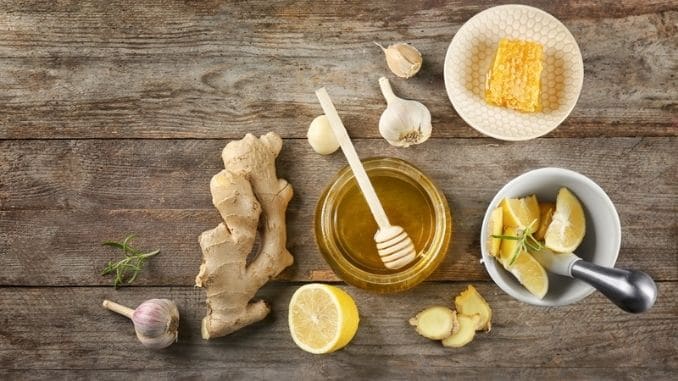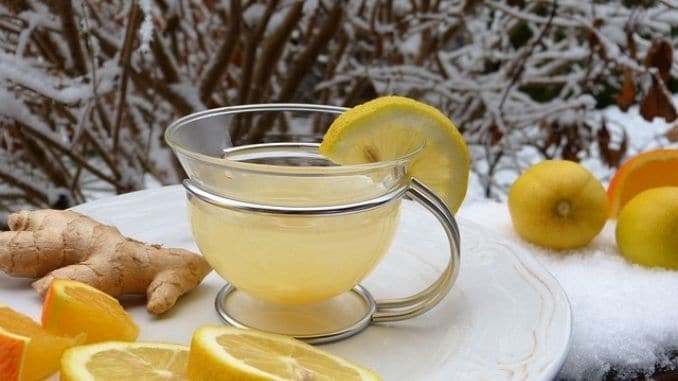
The Centers for Disease Control and Prevention (CDC) states that every year, adults have an average of two or three colds and children have even more.
You’d think with all our medical advances that we’d have found a cure by now but, unfortunately, we haven’t. Scientists are still working on it. In a recent study, they tested a new molecule that targets a human protein that all cold viruses need to grow.
This molecule worked against viruses related to the common cold as well as other viruses like those that cause polio and hepatitis A. It could potentially cure the common cold but, so far, it’s been studied only in the laboratory. Scientists have to conduct additional research to make sure it doesn’t harm human cells.
Meanwhile, we’re still stuck with doing our best to avoid these cold-causing viruses and, when they do attack us, manage the symptoms as best we can. Below are 10 natural remedies you can use to do just that.
What Is the Common Cold?
The common cold is an infection caused by one of up to 200 different viruses. The fact that there are so many is one of the reasons why finding a cure has been difficult. What may work against one virus is unlikely to work against others. It’s also why the body cannot develop resistance against them. Just when it learns how to fight off one type of viral cold, another type comes along.
Rhinoviruses are the most common types to cause the common cold, but others can cause it too, including coronaviruses, enteroviruses, the respiratory syncytial virus (RSV), the parainfluenza virus and others.
The viruses spread through the air or via contact with objects, followed by transfer to the mouth or nose. They can last a long time in the environment, up to 18 hours in some cases. Once a virus settles inside the respiratory tract, it multiplies. The immune system then goes to work killing the virus off, and that’s what triggers all the symptoms we experience, including the following:
- Sore throat
- Cough
- Fever
- Sneezing and runny nose
- Congestion
- Headaches
- Slight body aches
Since colds are caused by viruses, antibiotics — most of which kill bacteria — usually do not work against them. Doctors prescribe antibiotics only when there is a bacterial infection that accompanies the viral one. Treatment, instead, is focused only on relieving the symptoms while the body’s immune system eventually takes care of the virus on its own.
How to Prevent the Common Cold
To avoid getting a cold in the first place, follow these tips:
- Wash your hands regularly in warm, soapy water for at least 20 seconds
- Avoid touching your eyes, nose, and mouth
- Try to avoid people who are sick
- Use an antiseptic wipe or other cleaning solution to clean areas that are frequently touched like keyboards, doorknobs, light switches, sinks, drawer pulls, appliance handles, phones and counters, desktops and other surfaces
- When water isn’t available, use hand sanitizers and, during cold and flu season, keep these with you at the office and in the car
- Get enough sleep — seven to eight hours per night
- Eat a healthy diet and be sure to get plenty of vitamins
- Exercise regularly
10 Natural Remedies to Gain Relief From the Common Cold
Below are 10 natural remedies that have been found to help either relieve cold symptoms or assist the immune system in eradicating the viruses more quickly.
1. Zinc
Studies on zinc and the common cold have been ongoing since the 1980s. Results have been mixed but, overall, this is one that most health experts agree probably works. In one analysis of many studies, scientists concluded that zinc lozenges or syrup reduce the length of a cold by one day, particularly when taken within 24 hours of the first signs and symptoms of a cold.
In an earlier review, researchers determined that early zinc supplementation could reduce the duration of a cold and the severity of symptoms, to the point that the scientists recommended it to doctors. In a 2017 study, scientists found a dose of 75 milligrams per day of zinc in the form of lozenges reduced the mean cold duration by 33 percent.
The important thing is to take zinc only for a short period of time as long-term intake can interfere with copper metabolism.
2. Probiotics
Healthy compounds called probiotics found in yogurt, kombucha, miso, and other fermented foods may help prevent and shorten the common cold. These nutrients support the immune system, with studies suggesting they may be effective against viral diseases. You do have to use them regularly, however.
In a review of 10 studies involving nearly 3,000 people, scientists found that probiotics, when consumed regularly during a period of three months, helped prevent the common cold. In another review, researchers found that probiotics helped reduce the duration of a cold by about a day.
3. Vitamin D
Vitamin D also helps boost the immune system and is believed to help protect against respiratory infections by boosting levels of natural antibiotic-like substances in the lungs.
A recent review involving about 11,000 participants in 14 different countries found that vitamin D protected against respiratory infections. The effects were strongest in those who had low vitamin D levels, to begin with, although even those with sufficient levels experienced a 10 percent reduction in colds.
The scientists noted that colds are most common in the winter and spring when levels of vitamin D are at their lowest because of a lack of sunlight. Vitamin D worked best when supplementation was giving daily or weekly rather than more sporadically.
4. Vitamin C
Getting enough vitamin C on a regular basis may help you avoid the common cold or reduce its duration. In a 2013 review of 29 trials involving about 11,000 participants, researchers found that in regular supplementation trials, vitamin C helped reduce the duration of a cold.
In other trials, however, results were mixed, but the researchers concluded that since vitamin C is very safe, it “may be worthwhile for common cold patients to test on an individual basis whether therapeutic vitamin C is beneficial for them.”
5. Echinacea
Also called the purple coneflower, Echinacea is found in eastern and central North America and grows in moist to dry prairies and in open wooded areas. It’s long been used in traditional medicine to treat things like coughs, colds and sore throats. Modern-day research has discovered that it helps to boost the immune system, which is why it can be useful against the common cold.
Mainly, we have some evidence that Echinacea may help to reduce the duration of a cold by about 10 to 20 percent. It may also reduce the severity of symptoms and because of its immune-boosting effects, could be useful in prevention. Studies are mixed but, as the supplement is considered safe for most people, it’s worth a try during cold and flu season.
6. Garlic
Garlic has a natural compound called “allicin” that helps support the immune system’s fight against the common cold. Once inside the body, it stimulates certain immune cells, including macrophages, lymphocytes, natural killer cells, and others — all of which are big players in eradicating a cold virus.
Although studies are mixed on whether garlic can prevent or help treat colds, there is enough evidence to warrant giving it a try. Add more garlic to your meals or, during the cold season, consider taking a garlic supplement.
7. Ginger
Ginger is a powerful herb with many beneficial properties. We know that it helps ease nausea and soothe digestion, and we also know that it has a natural anti-inflammatory action. Traditionally, ginger was regularly used to treat colds, and recent studies have shown that it has antiviral activity, particularly against viruses that cause the common cold.
In a 2013 study, researchers used extracts of fresh and dried gingers on a human respiratory syncytial virus that causes the common cold and found that fresh ginger was effective against the virus.
Ginger may also help ease the symptoms of a cold including congestion and sore throat, especially if you take it in a tea.
8. Oil of Oregano
Like Echinacea, oregano has been used traditionally to treat colds and to maintain general health. Studies have also found that oregano extracts and oregano compounds have antimicrobial actions. It’s also a natural anti-inflammatory, which can make it helpful against symptoms like congestion and sore throat.
Add two or three drops to a glass of orange or grapefruit juice as a preventative measure or to help combat symptoms of a cold. You can also take an oregano capsule a few times a day or add the oil in a diffuser or vaporizer to help clear a stuffy nose.
9. Chicken Soup
If your mother used to feed you chicken soup when you were sick as a child, she was smart. Recent research has confirmed that this home remedy does work to help you feel better.
In the year 2000, researchers published a study showing that chicken soup contained a number of natural substances that helped ease symptoms of upper respiratory tract infections. Mainly, these compounds helped reduce inflammation, soothing symptoms like congestion and clearing the airways.
Choose soup recipes with lots of vegetables in them as the soup in the study included onions, celery, parsley, and sweet potatoes along with a flavorful, homemade bone broth. Then, make sure to eat slowly and breathe in the steam.
10. Honey
This natural sweetener can help kill bacteria and other microbes and is commonly recommended to help soothe sore throat pain. Studies have also shown it can be an effective cough suppressant.
In 2012, for example, researchers reported that honey helped improve nighttime coughing in children one to five years of age. There is also evidence that honey may be just as effective as dextromethorphan, a common over-the-counter cough suppressant.
To soothe a sore throat, drink tea or warm lemon water mixed with honey. To soothe a cough, take two teaspoons of honey at bedtime.
For the best foods to heal your body, check out The Best Foods that Rapidly Slim & Heal in 7 Days, here!








